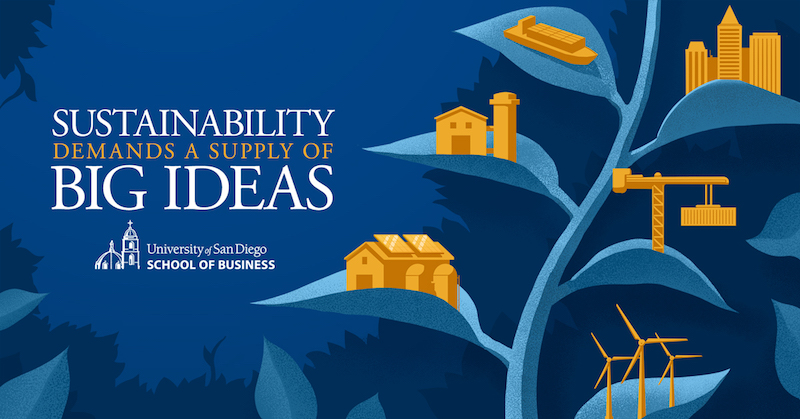Guiding the Green: How to Incorporate Sustainable Business Practices for Small Businesses

Sustainability is a core issue for both small and large businesses. Increasingly, businesses appreciate it from the standpoint of growth and profitability, as well as for their concern about reducing their carbon footprints and maintaining socially responsible business practices. A growing number of consumers share these concerns and want to be sure their purchases don’t contribute to the depletion of natural resources, the endangerment of wildlife and sensitive ecosystems or the violation of human rights.
In fact, sustainability issues like protecting the planet’s resources are so important to most people that 81 percent of global consumers believe that businesses must take the steps necessary to help protect the environment, according to the second quarter 2017 results of The Conference Board Global Consumer Confidence Survey, conducted in collaboration with Nielsen. Many consumers also reward companies that value sustainability, as reported in another Nielsen study that found that sustainable products can sell five times as fast as their non-sustainable counterparts.
Clearly, consumers care about sustainable business practices. The demand for companies that design environmentally responsible supply chains, draw on renewable resources and protect workers’ rights will likely grow in the years to come.
To thrive in this new era of sustainability in business, aspiring professionals need to cultivate the right skills and knowledge. The University of San Diego offers an evening part-time MBA degree that prepares graduates to respond to the undeniable need for sustainable business practices and to envision wealth creation following the 5 P’s: sustainable and socially inclusive (People), ecologically friendly (Planet), financially solid (Profit), builds harmonious societies (Peace) and fosters a sustainable economy (Prosperity).
Sustainability Is the Right Thing to Do
From an ethical point of view, why does sustainability matter? Businesses are a driving force behind a thriving society and as such, they have a moral responsibility to make decisions that will positively impact the communities and environment where they operate.
Sustainability involves more than keeping the air clean and not polluting the soil and oceans. It’s also concerned with using fewer natural resources across the supply chain and the just treatment of individuals and groups, including socially responsible decisions that protect people from harm. Ethical business practices can positively affect the well-being of people and the environment. For example, by sourcing materials from socially and environmentally responsible companies, businesses can support the promotion of business practices that are ethically and morally correct while avoiding the depletion of nonrenewable materials. Businesses can also adopt sustainability by ensuring that none of the suppliers they work with engage in unethical or discriminatory social practices, such as child labor. Businesses can be a force for ensuring that all employees around the world are treated in accordance with U.S. standards for fair work hours, safe work environments and adequate living wages.
Many companies have committed to environmental and social responsibility:
- Nike’s Standing Up for Equality, a commitment to social responsibility, fosters inclusion, empowerment and respect among company employees; it sponsors programs that promote those values.
- Taylor Guitars’ sustainability commitment combines transparent, legal and ethical business with environmental stewardship.
- IKEA chooses to use everyday sustainable materials, such as wood, cotton and natural fiber, as well as recycled and recyclable materials.
Sustainability Is Also Good for Business
Sustainability also offers many financial benefits to businesses. By reducing waste, for example, businesses can increase revenue and lower expenses while enhancing their brand reputation. The 2017 Cone Communications CSR Study revealed that 87 percent of consumers have a more positive impression of a company that supports social or environmental issues. A consistent goal for businesses is to build brand loyalty. Sustainable business practices can support this as well. The CSR Study further revealed that:
- 88 percent of consumers will be more loyal to a company that supports social or environmental issues
- 92 percent of consumers are more likely to trust a company that supports social or environmental issues
- 87 percent of consumers will buy a product with a social and environmental benefit
Clearly, sustainability not only makes sense for people and the planet but also makes good business sense. According to Simon Croom, Professor of Supply Chain Management at the University of San Diego School of Business, social responsibility across a business delivers ‘hard’ bottom line supply chain benefits as well as reputational and ethical benefits. Croom’s research found a significant positive relationship between socially responsible business practices and efficient operations. Engaging employees in the process of driving improvements throughout a business can reduce risk in operations, create greater safety and employee health benefits, and provide a conducive and desirable working environment.
How to Incorporate Sustainable Business Practices
Small businesses can implement various strategies to support sustainable business practices:
- Create a sustainability vision. A report by MIT Sloan Management Review and The Boston Consulting Group showed that 90 percent of executives see sustainability as important, but only 60 percent have a sustainability strategy. In order to implement sustainable practices, business leaders need to make sustainability a clear, meaningful priority. This is especially important for small businesses, where time and other resources are limited. Consider questions like, Where do you see your company in 10 years? How does sustainability play a role in that? Can you cut your carbon footprint in half or eliminate it altogether? Can you go zero waste? Can you find a supplier who sources raw materials in an ethical way?
- Conduct a sustainability audit. Examine how your company currently supports or undermines sustainability efforts. Consider company culture, employee engagement, community and social engagement, environmental impact, resource allocation, and carbon footprint. Be honest about what you’re doing well and what areas can be improved. Encourage others at your company to get involved in this process to gain perspectives beyond your own.
- Shift company culture. Creating an environment where sustainability is valued and encouraged is vital to long-lasting sustainability efforts. Get your team involved in your efforts by participating in sustainability audits, education programs and other office initiatives (e.g., recycling programs, community cleanup days). Encourage an inflow of ideas from your team members to reimagine innovative ways of redesigning packaging, processes and products that use fewer resources across the supply chain. Establishing a positive company culture is also a huge benefit to small businesses and startups because it helps to attract and retain talented employees who care about the issues your business cares about.
- Assess supply chain and reduce waste. Typically, 95 percent of the environmental impact of a product occurs even before it even reaches customers, so paying attention to supply chain impact is critical to improving sustainability. Look for environmentally friendly alternatives to costly, wasteful resources. On a large scale, think about where your raw materials are coming from and how your products are being manufactured. Or, consider switching to a renewable energy source like wind or solar. Find vendors and suppliers who share your values and foster those relationships. There are also countless small, inexpensive ways to reduce waste, from switching to high-efficiency light bulbs to printing double-sided (or going paperless altogether).
- Be transparent and open to change. Be open with your employees, stakeholders and customers. Share information about your labor practices, manufacturing policies and the sustainability of the materials you use. By being authentic about what you’re currently doing and what you need to work on, you not only help educate customers about sustainability issues but also hold yourself accountable for future improvement.
Join the Sustainability Movement
The urgent need to create a more sustainable world falls on everyone’s shoulders. Business can make a greater positive impact in the world by applying sustainable business practices and voicing their commitment to the environment and the well being of society at large. The part-time MBA program at the University of San Diego School of Business immerses students in real-world projects, analyzing and evaluating improvements for a range of organizations. Through classes like Sustainable Supply Chains, students are encouraged to question the status quo, developing the skills they need to tackle real-world issues.
In addition, MBA students at the University of San Diego don’t just learn to be socially responsible business leaders — they actively drive social change on campus. Recently, student recommendations led to changes in campus-wide recycling practices, water usage, packaging reduction, and built environment, resulting in greater environmental performance, cost reductions, and enhanced campus life.
Faculty/EA Question(s)
How does the University of San Diego School of Business prepare students for careers as ethically driven business leaders?
In our MBA courses, we focus on engaging students in real-life projects analyzing and evaluating improvements for a range of organizations. On the Sustainable Supply Chains course that I teach, students recently completed projects for the University of San Diego which included reviewing the soon-to-be-launched School of Business Complex for sustainability practices, opportunities for reductions in campus material waste, driving sustainable tactics in campus operations and sourcing for sustainable food supply. The recommendations of our students have been incorporated into the University’s planning and operations, and are likely to drive greater environmental performance and cost reductions at the same time as enhancing campus life across our operations and activities, including changes in our recycling practices, water usage, packaging reduction and built environment.
In other words, at USD we immerse students in real-world projects and encourage them to question the status quo. By getting real-world training on sustainability issues in class, our students are ready to tackle similar issues once they face them in the real world.
Simon Croom is a professor of supply chain management at the University of San Diego School of Business. He is one of the most cited professors in his field with a long list of publications including Integrating Sustainable Practices Within Supply Chain Management: A Systems Perspective and Impact of Social Sustainability Orientation on Operational Outcomes. Professor Croom is also the founding executive director of the USD Supply Chain Management Institute and served as the academic director of USD’s master’s in supply chain management program for five years.
Sources
Entrepreneur, “It's Official: Customers Prefer Sustainable Companies”
Entrepreneur, “What Big Companies Can Teach Small Business Owners About Sustainability”
Forbes, “3 Ways to Make Sustainability a Part of Your Business”
Forbes, “Do Customers Really Care About Your Environmental Impact?”
Forbes, “Transform Your Company into a Leading Sustainable Business”
MIT Sloan Management Review, “Corporate Sustainability at a Crossroads”
Nielsen, Global Consumers Seek Companies That Care About Environmental Issues
Nielsen, Sustainability Sells: Linking Sustainability Claims to Sales
United Nations, Climate Change
Contact:
Renata Ramirez
renataramirez@sandiego.edu
(619) 260-4658

